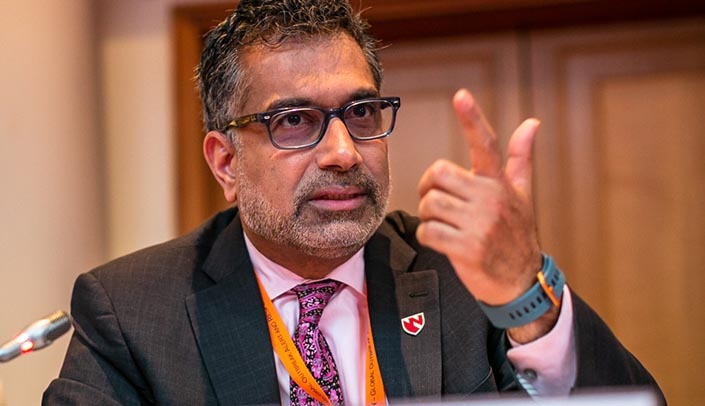Faculty from the UNMC College of Public Health have partnered with professors from the University of Nebraska-Lincoln to offer a new course aimed at exploring the ongoing COVID-19 crisis through the lens of international relations, with a particular emphasis on global leadership.
Offered as a five-week, online class that began July 13, “Saving the World: Global Leadership in the Time of Pandemics,” is taught by Patrice McMahon, PhD, director of the University Honors Program and professor of political science at UNL.
Guest faculty for the course include:
- Ali S. Khan, MD, MPH, dean of the UNMC College of Public Health, who will discuss the challenges related to the combating global pandemics and emerging infectious diseases;
- Jesse Bell, PhD, Claire M. Hubbard Professor of Health and Environment at UNMC, who will lead the students in an exploration of the connections between climate change and pandemics;
- Azar Abadi, PhD, UNMC Department of Environmental, Agricultural and Occupational Health, will discuss how climate and weather conditions influence the transmission of SARS-CoV2;
- Abigail Lowe, UNMC Center for Emergency Preparedness, will lead the students in discussing the ethical challenges that must be addressed in pandemics;
- Sharon Medcalf, PhD, director, UNMC Center for Biosecurity, Biopreparedness and Emerging Infectious Diseases, will present on the foundational concepts of preparing and responding to pandemics; and
- Regina Werum, PhD, professor of sociology at UNL, who will help students unpack the German response to the current crisis.
Jessica Tschirren, assistant dean for student affairs in the UNMC College of Public Health, will help conclude the class by talking to students about the challenges of leadership in the times of misinformation.
“We were thrilled by the opportunity to collaborate with our UNL colleagues to bring together this interesting and timely content to students,” Tschirren said. “Between our two institutions, we have such a wealth of expertise in global security and international relations, it makes perfect sense that we work together to bring that expertise to our students. Hopefully we will also inspire some to join us in this work in the future!”
Tschirren said the faculty from UNMC will help students understand some of the science behind the pandemic, including how the virus spreads, potential treatment methods and environmental factors that could impact the virus.
Through readings, videos and other materials, students also will develop a historical context for responding to pandemics and other public health crises, drawing on knowledge gained from the 1918 influenza pandemic and the more recent Ebola outbreak.
Throughout the course, Dr. McMahon will lend her expertise as a scholar of international relations, helping students understand the various institutions and ways that international cooperation can transpire and how global cooperation can address a crisis.
